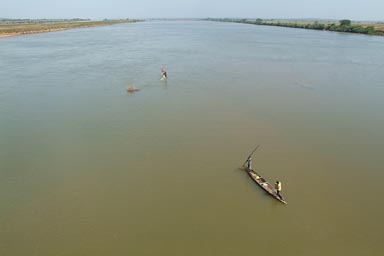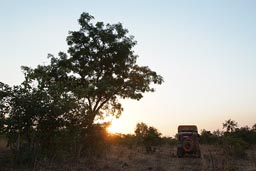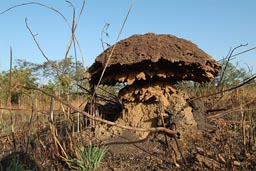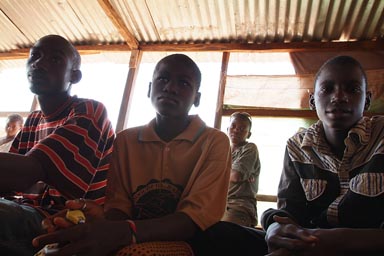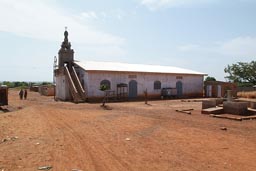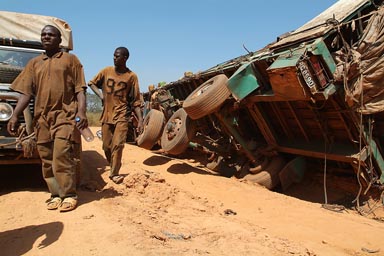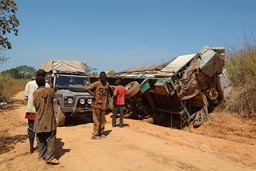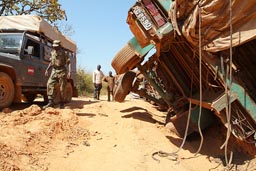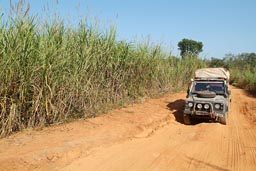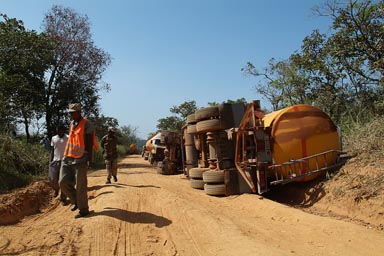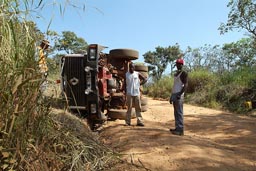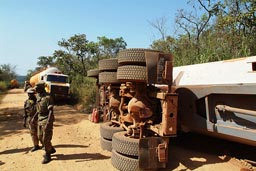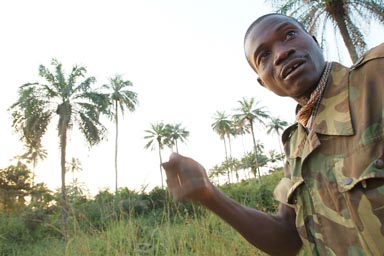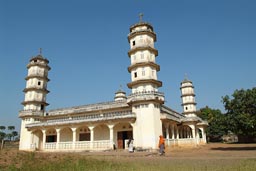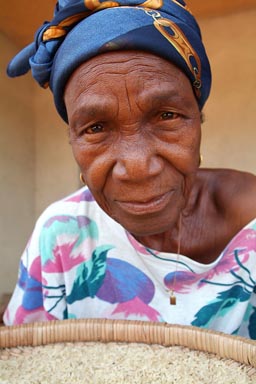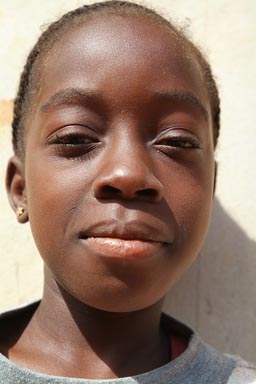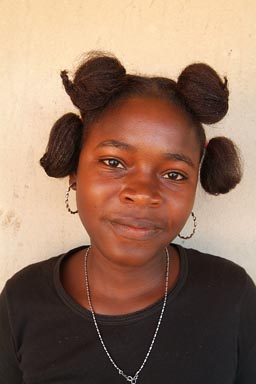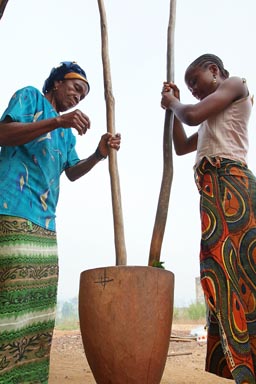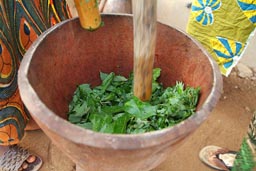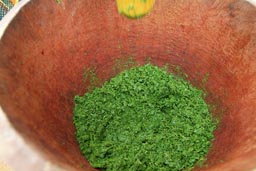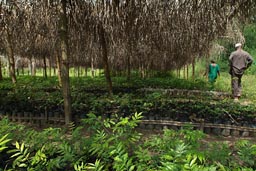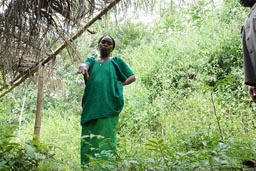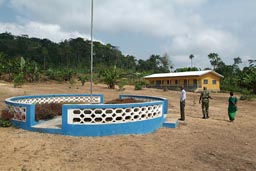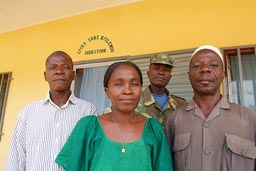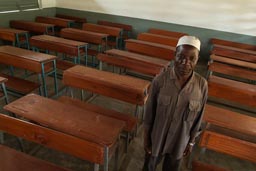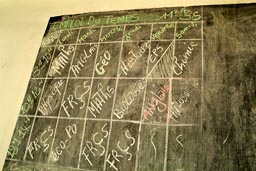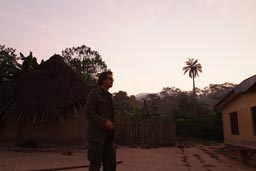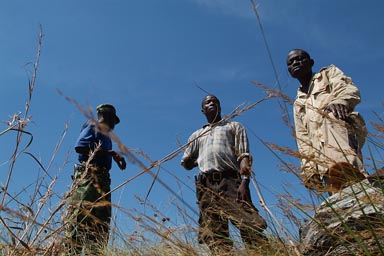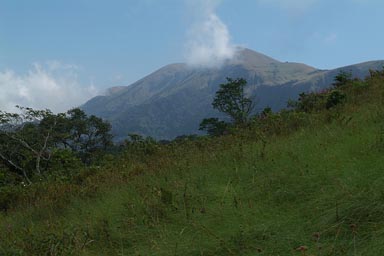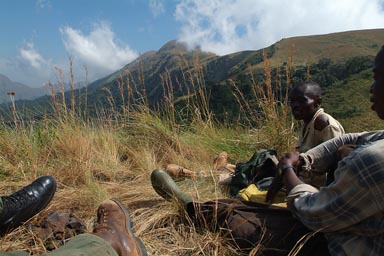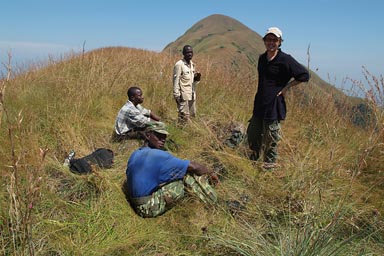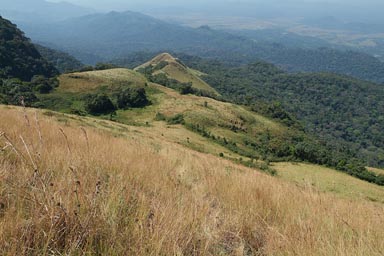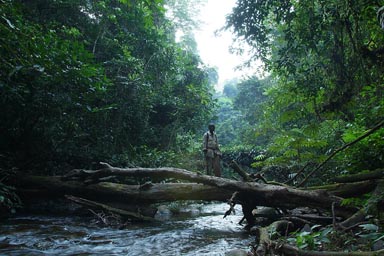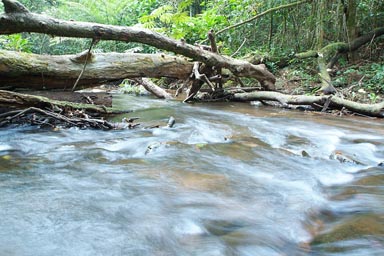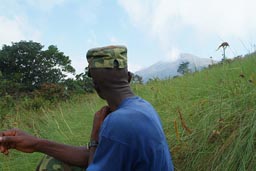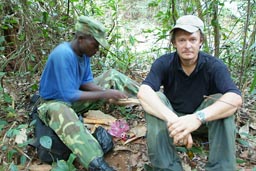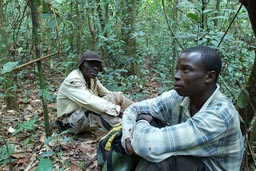www.thisfabtrek.com > journey > africa > guinea > 20061129-nzerekore
Later becomes even later.
When I post this it is mid February 2007, more then 2 month after the occurrence of the events reported on in this page.
I am back in Vienna, it is weeks after Hasna has given birth to our twin boys Daniel and David.
And sadly so much has changed in Guinea in the meantime. Le pay va mal.
...
Savanna has me back.
Download GPS (KML) track/waypoints.
The Land Rover, I find as I left it, engine starts. Really it has been 9 month since last touring with it.
I change my mind, won't be going to Burkina/Ghana. Guinea seems just about right, my old dream-destination with its mountains, and Conakry's music scene, some where in a western dead-end street corner of the African continent, right for my time slot of maximum 6 weeks.
To the south of Guinea you have Sierra Leone, Liberia and Côte d'Ivoire, which all 3 have for years been war ridden no-go zones. [This though is changing right now].
This is Tuesday November 21 2006. I leave Bamako follow the Niger river via dirt roads, enter Guinea.
Guinea is real Africa, but a part of Africa I've not traveled yet. And scarce is information on internet, or from other travelers.
In addition driving the Landy again these first days feels unusual - It's a beast. And I have to get used to sleeping out in the bush. Get used to judging my every situation again, especially at night.
There are people everywhere, walk, bike, move their cattle about. Suggests many little villages.
When I stop, voices are being carried over the savanna, I hear them work, prepare food, shout after their cattle or donkeys, hear them from far or just around the corner, or just behind those bushes or coarse grass that stands so very high and impenetrable.
This is winter, the dry season has started a while ago and grass stands at its highest. A month or two later the savanna would burn with bush fires to make room for a new vegetation.
It's so quiet, so the voices all maybe further away, there's not much traffic.
At night and these first nights are new moon pitch dark, sounds appear even nearer, in addition there's these lights from all directions where campfires are stable while torches of shepherds move about.
After dusk second night this old man who arrives from where I have left the road carries an ancient wooden shafted rifle over his shoulder. A hunter!?
He speaks perfect French. Has had no luck tonight. Hunting in general is getting harder explains Ibrahim Khalid Traore. "Only when we start burning the bush we can hunt."
10 years in the military, now back to work the fields of his parents, a tall educated man who likes the whites. "God has arranged for us to meet and only he knows where we meet again". He would go and tell everyone in the village that I am here so no one would disturb me. Like children or cattle in the morning.
Where I camped the night before already someone had brought me 2 litres of cow's milk, people are curious/friendly/poor, shaking many peoples hands reveals how hard they work, skin is thick like leather, stiff like a robe that has seen too much water/sun/water/soil/sun.
Days are hot and wearying driving about, nights are cold. I sleep from 8 onwards, dead like a stone. Try recapture my energy from the Bamako days of partying. The notion is still right that you rather get robbed in France or Spain or Germany on the Autobahn then down here in the middle of nowhere.
Siguiri, exhausted from the heat, a cafe, though I have not changed money yet.
The manager invites me.
Gives me a cigarette lighter as a present.
Which has a built in LED torch.
Soon many teens come and watch curiously.
On their way home from school.
Their school books read: "Pertinence, Equité, Compétence."
Drive south, Route KanKan, Kérouané, Beyla.
Well I could tell how it happened.
2 nights ago it was new moon pitch dark, your lights probably not working and your truck hopelessly overloaded and - yes these roads are bad.
And you go into the left hole then into the right hole and all the weight on top swings to the left and then to the right and ...
Difficult with 5, 6 and more axles, always one wheel going in somewhere.
- And. Fortunately no one had been gravely injured. Half the crew always sits on top. But trucks drive slowly.
This truck really fell apart. Crucial chassis mounts and links had been welded and rewelded many times.
How can you get this vehicle going again I am asking myself? They probably will and if it takes them weeks or month.
Just always a question whether the crew (anything from 5 to 10 people) stays or just leaves for good.
Guinea's South, called the Forest Region, has two basic road connections with the capital Conakry.
The main, mostly sealed road runs from Conakry via Mamou, Faranah, Kissidougou, Macenta into N'zérékoré. A second much longer, mostly unpaved, reaches the South via Kankan and Kérouané. But really it is "not safe for heavy trucks (OSAC)".
At Kankan I enter the bit that is not sealed and many accidents/turned over trucks I pass. Heavy rain had (probably already a while ago) rendered the main road impassable. And traffic is tormented to go round Kankan, making Conakry N'zérékoré a weeks to 2 weeks journey. And some never arrive.
And merchandise never arrive, Locaux (plantains, bananas for frying) from the fertile Forest Region destined for the markets of Conakry, after a 2 weeks journey, just imagine ...
Similarly can prices of fuel in the south triple within days once reserves dry up and road problems persist. One turned over tank car can easily close the second road.
Only slowly the problem is realised but far from being tackled. Leaders are too busy elsewhere.
Guinea is a land so rich in resources (minerals like bauxite, iron ore) and fertile with an abundance of rain. But despite this bounty of supplies its economic indicators remain in the red, skyrocketing inflation (3rd highest in the world after Zimbabwe and Iraq) and wide spread corruption (the Corruption Perception Index ranks Guinea just before Haiti) has left its people one of the world's poorest. Most, farmers, civil servants, students get by on less then a dollar per day.
With Jacques to N'Zérékore.
23rd of Nov. Progress down south is slow. A half a dozen hitch hikers. Later I pick up Jacques Soropogui. 28. On his way from Kindia (near Conakry) to N'zérékoré (my destination). And - already a week on the road.
Kérouané just before dusk. Jacques cleans the Landy inside and outside. I don't mind, I am tired, dust is everywhere. He is keen to come with me till N'zérékoré the next day. His family is there, mother, sister, has not seen them for years ... Just been put on unpaid leave from his employer, the Army. No money.
He seemed trust worthy from the beginning, - . Ok, you can sleep in the front.
I invite him for dinner. He likes a beer. Christian (just 8% in Guinea, nothing unusual in Guinea's south). I give him a blanket. He wakes me at 8, - by cleaning the Landy again. He is keen.
After Beyla road conditions change a bit to the better. And after Boola the high standing dry grass of the savannah gives way to a forest like vegetation, palm trees, bamboos, but also much older much taller trees, a jungle.
Every so often the dirt road winds across little ranges of elevations in the land, no more then 700m high, forested densely, tall rise its old massive tropical trees, sunlight glimmers through just a bit, GPS connection ceases.
Side roads don't really exist. Still people come in and out of the "jungle", go up and down the road, from one village to the other, greet, no more donkeys or cattle down in the south. (Tsetse fly)
The green jungle around seems impenetrable. Seems. Is it a jungle at all? Is it wild?
Or just rural? With villages again just about everywhere, connected by a network of foot paths? Those à côté de la route, any number of straw roofed round mud huts, actually Christian huts are squared or/and bricked, and pigs roam, [Guinea is a largely (95%) Muslim country] .....
... and "in between" the "jungle"!? or plantations? like coffee, kakao, cola, palm-oil, sugar cane, manioc, yam, rice, bananas, papayas, plantain and so much much more that is being cultivated, or just grows? Some is harvested all year round, more then once, rain and sun and heat is plenty.
Funny it all grows in a mixed type of way. The untrained eye just sees a jungle.
We arrive late in N'zérékoré.
This has been 24th of Nov, Hasna's birthday and I have not had a chance to get hold of her.
The next day Jacques wakes me early, - cleaning my car.
Chez Jacques
Jacques is youngest of some 6 or 7 brothers and sisters (même père, même mère). This is never easy when growing up. The eldest has someone to delegate things to as soon as the next one is born and eventually assumes chef de familie status. The youngest never ever has anyone. The youngest has the most people to look up to, all his life.
We come home late, to his sister's, Marie's house, his mother and another adult woman live here as well. And a large number of children, own ones and other protégées. In Guinea when you have a bit of of funds you're obliged to share. Parents are some where to make ends meet, dispose off their little ones. A daughter of Jacques' from a former affair lives here as well. Jacques has 4 more children living with his wife in Kindia near Conakry.
This is how society works here. And it works. And all of the children help in the house, kitchen, laundry, fetch water. The day I realise how far children carry the water from I decide to do without a shower. The family uses some 50 litres or more every day which is all carried home on the head by the children in the house.
In a usual home in Guinea there is no running water, no canalisation (just latrines), no electricity (candles or a group élecrique). No TVs. No antennas on houses. Streets in towns are usually not paved. There is no street lights.
N'zérékoré the centre in the South by all means has some paved roads. There is no public transport, people walk, even Jacques' mother in her late 70s or above walks to the market and back 7km every day, maybe this is why she is so fit.
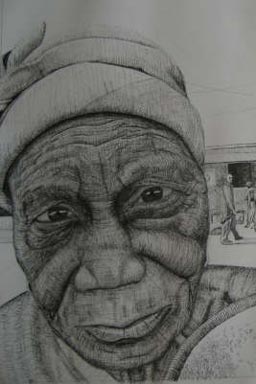
Still the Cyber works well. I download 500 messages in no time at all and I talk to Hasna. And it is packed with a young, smiling, welcoming new generation, the music in the background, African Salsa.
It is these young with an eye and an ear for the rest of the world who are going to change the way this country is run.
Though Jacques has never been to an internet cafe.
Marie and Koulé
"We have to go and see my sister in Koulé". So we go. Marie works for the Centre Forestier de N'zérékoré, currently she overseas reforestation works near Koulé and other areas. Sensitising local population, assessing bio diversity, mapping biospheres is what they do. Projects are financed by western governments, the one in Koulé by Germany.
Near by a school and the director Moussa Bamba is happy to show us round the newly erected compound. In one class: 52 boys, 2 girls, half the girls absent, "Girls often become pregnant", it is a lycée meaning for 15-20 year olds. Other classes have more of an equilibrium between boys and girls.
Lesson plan shows 8 hours of French per week, 4 hours of English, 4 of Maths. High priority of languages makes sense.
On the door next to the director's office is written: Library. Inside empty shelves. In my books box on top of the Land Rover I dig out the French version of Herman Hesse's Siddhartha, and Fatema Mernissi's reves de femmes and a book about overland travel in Africa.
Moussa Bamba is delighted. "This is the start".
Monte Nimba - Mount Nimba
Mount Nimba was my prime destination in the South. And surprise, - Jacques eldest brother Pepe Emmanuel Soropogui works for the CEGENS (Centre de Gestion de l’Environnement du Nimba-Simandou) in Lola. The centre is responsible for all environmental and legal questions.
He has known and walked the Nimba for 15 years. But he is more then just a scientist? and nature lover, he is a poet and writer.
The Mount Nimba Ranges span from deep in Liberia to Guinea and Côte d'Ivoire rising to 1752m above sea level. The Guinean and Côte d'Ivoirian sections were declared a UNESCO World Heritage site in 1981.
But the site is also inscribed on the list of World Heritage in danger. The Guinean Government in 1991 removed a large part containing iron ore from the reserve. Extraction in the exclusion zone has already begun. However other parts remain dedicated to total protection. Info to be found in Winrock Ecosystem files.
Mount Nimba offers stunning nature on the one hand ranging from predominantly primary forest to high altitude grassland. Also the reserve is home to some 200 endemic species, as well as a small group of wild chimpanzees - but read all in the UNESCO data sheet.
And Pepe Emmanuel gives us directions. In Bossou we find 2 guides Pascal Goumy and Kassie Henri Doré, Henrie is premier guide de projet de la recherche scientifique sur les chimpanzés. With the right people already this evening we drive up to the village of Seremara at the foot of Mount Nimba. One classic African village, round and squared grass roofed mud huts and a great deal of activity at night, children dancing, fires burning, dinners being prepared.
Henri organises a couple of plastic bottles with the famous white wine of raffia (a palm tree), new unfiltered fresh, with a bit of an aftertaste, we all down 3 large glasses quickly. "You have to be here on the 31st of December".
5.30 28th of November, I get up have a small coffee, share it as usual. No breakfast.
For the 6 hours walk to the 1750m Mount Nimba no one of my 3 companions takes much to eat or a lot of water. We fill up our plastic bottles in a stream in the jungle. They don't seem to be hungry or thirsty, walk/climb in huge steps. I do as they do - sometimes it is hard to be African.
The climb is steep and more up and down then up, first through thick secondary then primary rain and dry forest, after 3 hours we step out onto the open higher up plains and hills.
Climbing remains slippery, stones under high grass, there's no real path and I fail to reach the top.
We turn round at 1480m, after 900 metres of altitude difference. We would not have made it. Where we turn the summit seams near, only seams near. But we reached the saddle, Côte d'Ivoire is just a stone throw away and we are rewarded with a view far into Liberia. My guides have climbed the Nimba from all 3 countries, know every little path in and out.
Another 4 hours to return. Path down through the jungle is again slippery/nearly as exhausting as the way up. The pain will remain for the days to come.
How many tourist climb the Mount Nimba every month? 2 to 3 is the answer. [Compared to 100 a day for Jebel Toubkal in Morocco].
The Guinea adventure does not stop here. Stay tuned.
www.thisfabtrek.com > journey > africa > guinea > 20061129-nzerekore

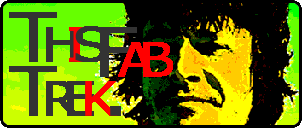

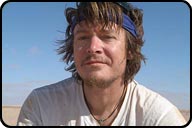
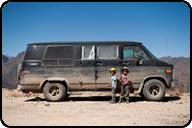
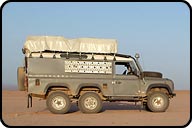

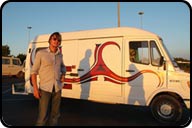
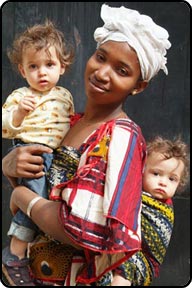
 contains Festival/Fiesta/Art photography.
contains Festival/Fiesta/Art photography.
